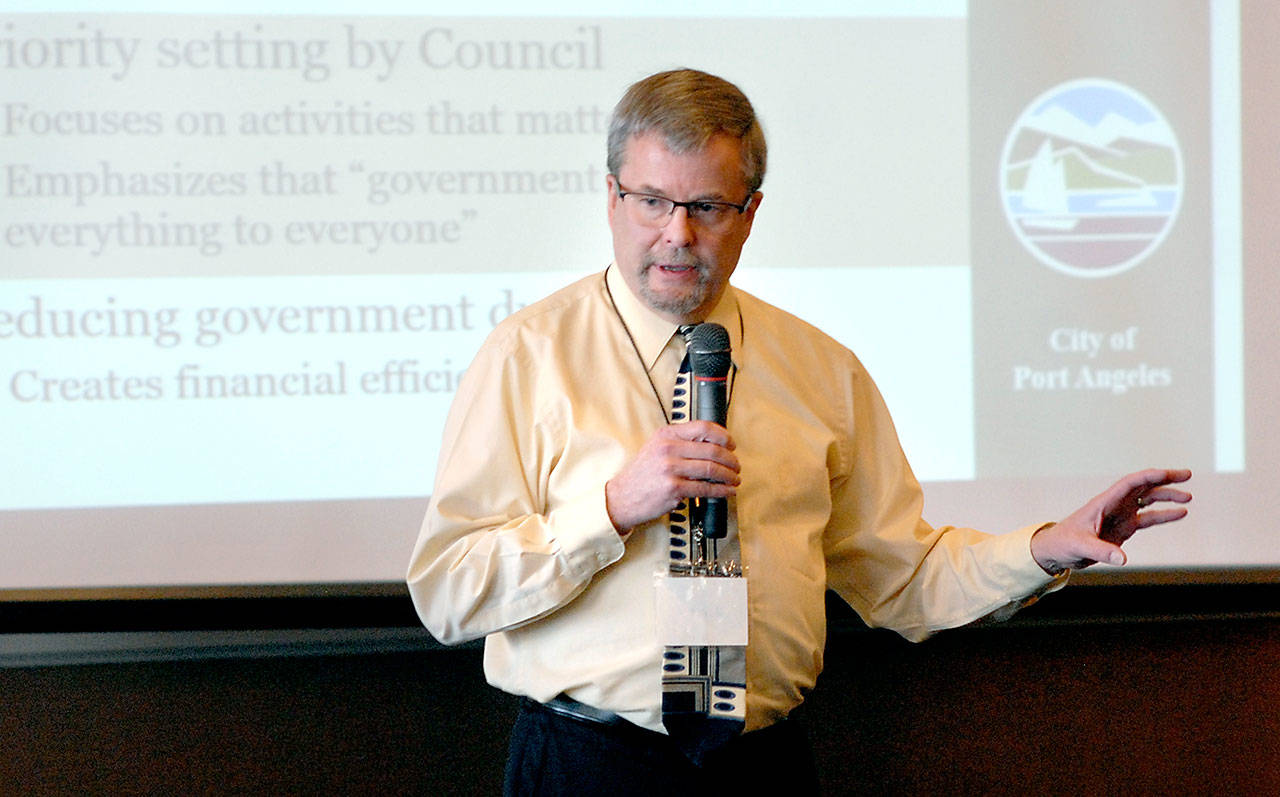PORT ANGELES — The city of Port Angeles’ finances are stable and environmental hurdles are being cleared, City Manager Dan McKeen said in a “state of the city” presentation Wednesday to business leaders.
But the second-class-vs.-code-city challenge looms for Port Angeles in November, he said.
McKeen spoke to more than 65 participants at a Port Angeles Regional Chamber of Commerce luncheon at the Red Lion Hotel.
Last May, in an effort organized by residents upset by the city council’s then-pro-fluoridation majority, a petition with far more than enough signatures was submitted to hold an election that would change the city from a code city with home-rule and citizen-initiative powers to a second-class city without those powers.
Voters would make the change Nov. 7 to a second-class designation “in order to elect a full new City Council,” according to the petition.
Such a change has “never been done in the state’s history, and there’s probably a pretty good reason for that,” McKeen said during his 45-minute presentation.
“Does state law even allow the election of a full city council?” he asked.
“If we put something forward, we want to make sure that it has the ability to do what is intended.”
City council elections are staggered — four council members are up for election at the same Nov. 7 election, at which voters would decide on changing to a second-class form of government.
Other new members could be elected at the next available election in 2018.
McKeen said in an interview that a legal review on the validity of the petition is being conducted by professor Hugh Spitzer of the University of Washington School of Law. That is expected to be available for the city council’s review at its next regular meeting March 21.
According to the nonpartisan Municipal Research and Services Center (MRSC), a code city allows “broad authority in all matters of local concern,” while a second-class city has “only those powers expressly or implicitly granted by [the] Legislature.”
According to the MRSC, Port Angeles would lose home-rule powers, which McKeen said at the luncheon were granted to allow cities to respond to the progressively complicated issues they faced in the 1950s and 1960s.
Port Angeles was a second-class city until 1971, when it changed to a code city.
“Second-class cities basically operate on the concept that to do something, you have to have state authority to do it,” McKeen said during his presentation.
McKeen told the group, without elaborating, that “a lot of misinformation” has been circulating in the community about the impact of a second-class city designation.
He said in a later interview that some of that misinformation suggests that a second-class-city designation would expand public meetings law as it relates to advisory committees.
“If the city reverted to a second-class city, it’s under the same requirements of the Open Public Meetings Act that it has now,” McKeen said.
Nor does changing the form of government change the city’s ability to incur debt, McKeen said.
Gerald Steel of Olympia, who represents the anti-fluoridation group Our Water, Our Choice!, which sponsored the petition, said Wednesday he is convinced the petition is legal.
“Code city gives more power to the council, and second-class city gives more power to the voters,” Steel said.
Fluoridation of city water ended in August in anticipation of an advisory vote Nov. 7 on whether to restart the practice.
On city finances, McKeen told luncheon-goers the city is not using general fund reserves for ongoing expenditures and has saved $950,000 since 2011 by having 13 fewer employees.
In addition, a project stabilizing the regional landfill, where years ago garbage that couldn’t be burned was pushed over the side of the bluff, was completed under budget in 2016 with $6.2 million in state financial assistance, he said.
Also completed under budget was the city’s $46 million combined sewer overflow project, the most expensive public works project in the city’s history, McKeen said.
There were 25 million gallons of combined sewer overflow — rainwater and sewage — that poured into Port Angeles Harbor between Sept. 15, 2015, and Feb. 28, 2016, McKeen said.
The system became operational in September.
The discharge has been “zero to date,” McKeen said to clapping from the audience.
________
Senior Staff Writer Paul Gottlieb can be reached at 360-452-2345, ext. 55650, or at pgottlieb@peninsuladailynews.com.

